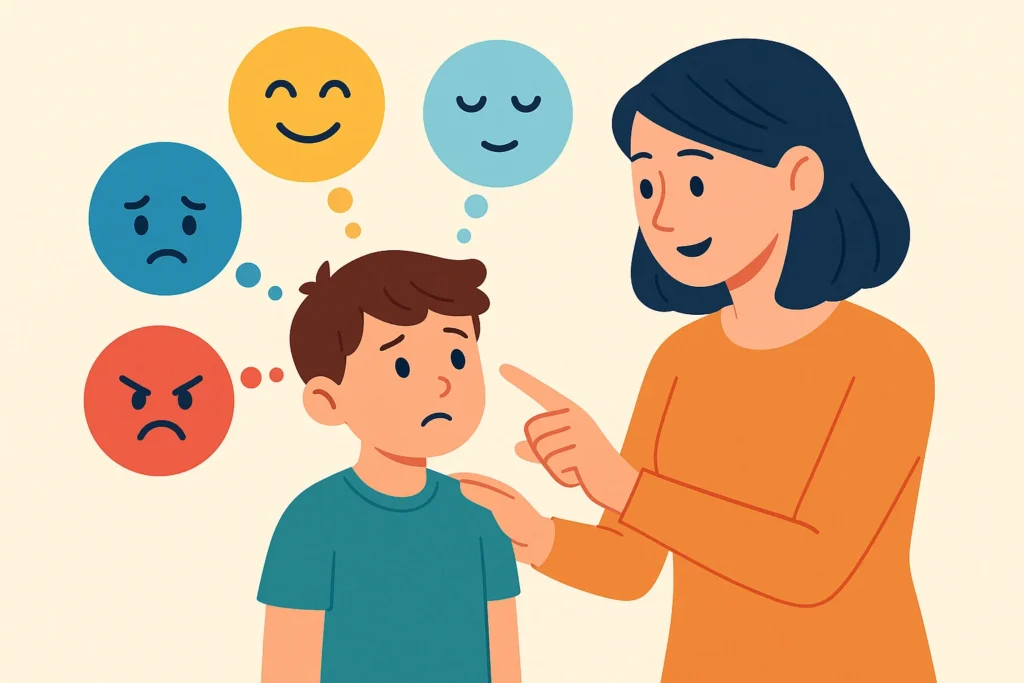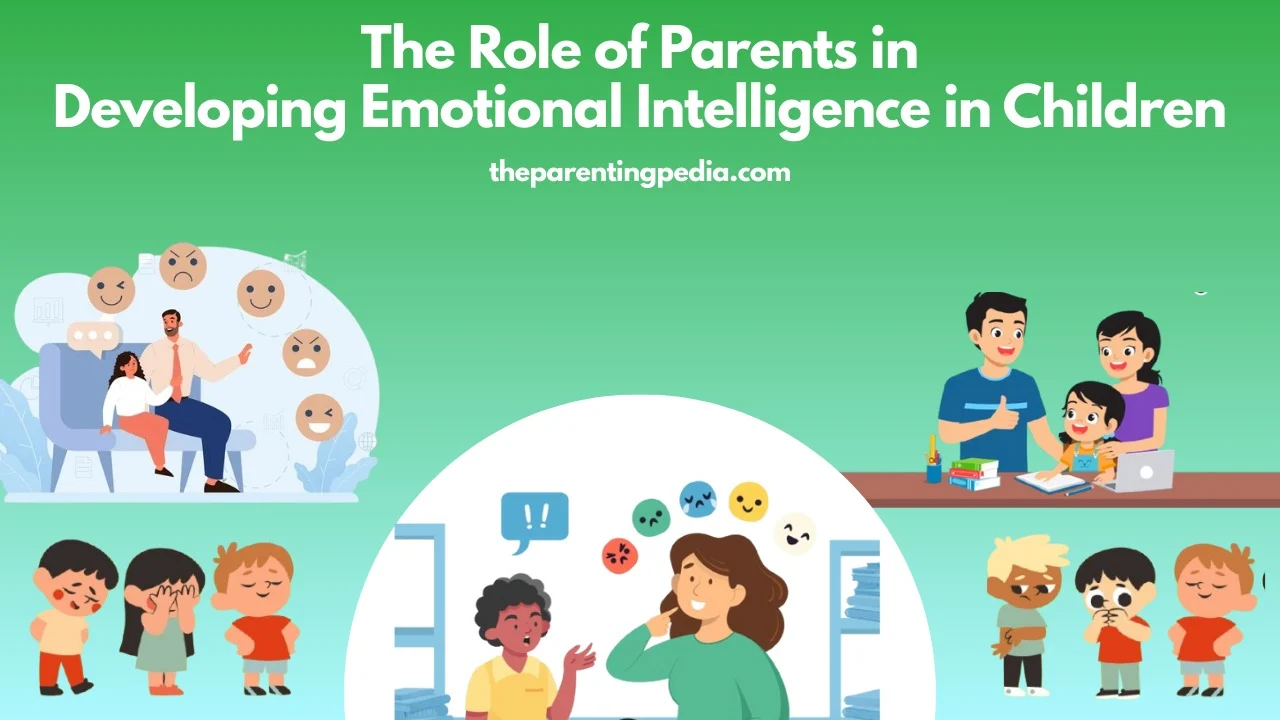Parents want their children to grow up happy, healthy and successful. While good grades and strong skills matter, there is something even more important that often gets overlooked, that is, emotional intelligence. Emotional intelligence is the ability to understand, manage, and express emotions effectively, both of ourselves and those of others. It is what helps children handle frustration, make friends, bounce back from setbacks and show kindness towards others. And here is the best part, emotional intelligence can be taught to children and parents play the biggest role in shaping it. In this article, we will explore what emotional intelligence is, why it matters and how parents can help their child develop it in everyday life.
What Is Emotional Intelligence?
Emotional intelligence is not about being happy all the time. Instead, it is about being aware of our emotions, knowing how to handle them in healthy ways and being able to relate to others with understanding and care. Children are not born with emotional intelligence, they learn it by watching, listening and experiencing. Emotional intelligence can be divided into five key areas:
- Self-awareness – recognizing our own feelings
- Self-regulation – managing our emotions appropriately
- Motivation – staying positive and focused
- Empathy – understanding the feelings of others
- Social skills – building healthy relationships

Why Is Emotional Intelligence Important for Kids?
Research shows that EQ (Emotional Quotient) is just as important as IQ (Intelligence Quotient) and sometimes even more important, when it comes to long-term success and happiness. Kids with strong emotional intelligence are more likely to:
- Do well in school
- Make and keep friends
- Handle stress and conflict better
- Develop self-confidence and resilience
- Avoid harmful behaviors like aggression or withdrawal
How Parents Shape Emotional Intelligence?
Children are constantly learning from the adults around them. From the way they handle frustration in traffic to how they talk to each other after a long day, child is watching and learning. Here are some key ways that parents can influence emotional development in children:
1. Modeling Healthy Emotions
Children learn by imitation. When parents manage their emotions calmly, talk about their feelings or show empathy, their child picks up those skills.
Example: If parents are upset, saying, “I am feeling really frustrated right now, so I am going to take a deep breath,” teaches their child that it is okay to feel upset and shows them a positive way to deal with it.
2. Validating Feelings
One of the most powerful things a parent can do is simply listen and acknowledge their child’s emotions. Instead of saying to child, “You are fine, stop crying” parents should say, “I see that you are upset. Do you want to talk about it?” This helps their child feel safe and understood, which builds emotional awareness and trust.
Also Read: Encouraging Effective Time Management For Children
3. Emotion Coaching
Emotion coaching means guiding child through difficult feelings rather than brushing them off or solving the problem too quickly. For example, if child loses a game and is angry, parents can say, “It is okay to feel mad. Losing does not feel good. Do you want to talk about it or take a break?” This helps the child feel understood and teaches them how to manage disappointment in a healthy way. Over time, kids learn how to label their feelings, understand why they feel that way and choose healthy ways to cope with them.
4. Setting Boundaries with Compassion
Teaching emotional intelligence does not mean letting children do whatever they want. Kids need limits but they also need to feel respected. Therefore, parents should try a calm approach instead of yelling on children. They can use phrases like, “I see you are angry, but hitting is not okay. Let’s take a break and find a better way to express how you feel.” This helps children learn that all kind of emotions are okay, but not all behaviors are.

Simple Ways Parents Can Encourage Emotional Intelligence In Children
Parents don’t need a psychology degree to raise an emotionally intelligent child. Here are everyday strategies that really work:
1. Talk About Feelings Regularly
Parents should use feeling words like happy, sad, worried, excited and angry in daily conversation. They should encourage their child to name what they are feeling and explain why. Example: “You look excited! Is it because your friend is coming over?” This encourages children to recognize and name their emotions, which strengthens emotional awareness.
2. Read Books That Explore Emotions
Stories are a great way to explore emotions safely. Parents should ask questions to children like “How do you think that character feels?” or “What would you do if you were in that situation?” These questions help children build empathy and understand different perspectives.
3. Play Emotion Games
Games like facial expression matching or emotion charades(pretense) make learning about emotions fun and interactive.
💡 Do Simple Stuff. Get Cool Rewards. Click to Claim!
4. Create a Calm-Down Space
A small corner with pillows, books or calming toys can be a safe space for child to take a break when emotions run high.
5. Praise Effort, Not Just Results
Parents should encourage their child when they notice them trying to manage their feelings. They should use phrases like “I saw you take a deep breath instead of yelling. That was a great choice.” or “You shared your toy even though it was hard, that shows kindness.” Positive feedbacks like this reinforces emotional regulation and encourages children to repeat those healthy behaviors.
6. Let Them Make Choices
Letting children make age appropriate choices helps build confidence and teaches responsibility. This also helps them learn how to make decisions based on how they feel and what they need.
🎁 Take Quick Offers, Grab Your Reward Instantly!
Long Term Benefits of Raising Emotionally Intelligent Kids
When children grow up in a home where feelings are respected, expressed and managed in a healthy way, they develop strong emotional intelligence. This valuable skill benefits them throughout life. Children with high emotional intelligence are more likely to build healthy relationships, succeed in school and future careers and enjoy better mental health. They learn to make thoughtful decisions, handle challenges with resilience and treat others with empathy and kindness. Emotional intelligence helps them understand themselves and connect with others. In short, it lays the foundation for a happy, balanced, and fulfilling life both in childhood and adulthood.
Conclusion
Raising emotionally intelligent children does not require perfection, it requires presence, patience and intention. By listening to their child’s feelings, staying calm in emotional moments and guiding them toward healthy ways to express themselves, parents can help their children grow into thoughtful, resilient individuals. These daily interactions teach children how to understand their emotions, manage them and connect with others in meaningful ways. Over time, these small efforts create lasting emotional intelligence in children.

FAQ
How to develop children’s emotional intelligence?
To develop children’s emotional intelligence, model calm behavior, name and validate their feelings and encourage open communication with them. Use everyday moments to teach empathy, problem-solving and self-regulation. Ask reflective questions, read stories about emotions and praise emotional efforts. Consistent support helps children understand and manage their emotions effectively over time.
How can parents support their child’s emotional development?
Parents can support their child’s emotional development by being attentive, listening without judgment and validating their feelings. Modeling healthy emotional responses, encouraging expression through words or play and creating a safe, loving environment helps children feel understood. Consistent guidance builds confidence, empathy and emotional strength in child for lifelong well-being.
What is the role of parents in the emotional development of children?
The role of parents in the social-emotional development of early childhood includes several aspects, including as educators, guides, supervisors, facilitators, and friends. As educators, parents provide education through habituation and role models to foster children’s self-confidence and mutual respect.
What are the 5 C’s of emotional intelligence?
Goleman’s EQ theory comprises five core components: empathy, effective communication or social skills, self-awareness, self-regulation, and motivation.
How can parents help children develop emotional self-regulation?
By staying calm, showing that you care and offering sensory experiences/other calming strategies, it can make all the difference in getting your child back to their “set point”. Self-regulation is all about having the ability to manage our emotions and respond to what our bodies need in an emotional situation.
📸➡️ “One click, one link — make your images shareable with ImageLink.online”
